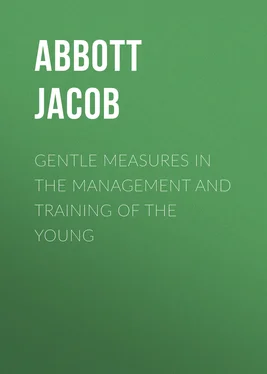Jacob Abbott - Gentle Measures in the Management and Training of the Young
Здесь есть возможность читать онлайн «Jacob Abbott - Gentle Measures in the Management and Training of the Young» — ознакомительный отрывок электронной книги совершенно бесплатно, а после прочтения отрывка купить полную версию. В некоторых случаях можно слушать аудио, скачать через торрент в формате fb2 и присутствует краткое содержание. Жанр: foreign_edu, pedagogy_book, upbringing_book, на английском языке. Описание произведения, (предисловие) а так же отзывы посетителей доступны на портале библиотеки ЛибКат.
- Название:Gentle Measures in the Management and Training of the Young
- Автор:
- Жанр:
- Год:неизвестен
- ISBN:нет данных
- Рейтинг книги:5 / 5. Голосов: 1
-
Избранное:Добавить в избранное
- Отзывы:
-
Ваша оценка:
- 100
- 1
- 2
- 3
- 4
- 5
Gentle Measures in the Management and Training of the Young: краткое содержание, описание и аннотация
Предлагаем к чтению аннотацию, описание, краткое содержание или предисловие (зависит от того, что написал сам автор книги «Gentle Measures in the Management and Training of the Young»). Если вы не нашли необходимую информацию о книге — напишите в комментариях, мы постараемся отыскать её.
Gentle Measures in the Management and Training of the Young — читать онлайн ознакомительный отрывок
Ниже представлен текст книги, разбитый по страницам. Система сохранения места последней прочитанной страницы, позволяет с удобством читать онлайн бесплатно книгу «Gentle Measures in the Management and Training of the Young», без необходимости каждый раз заново искать на чём Вы остановились. Поставьте закладку, и сможете в любой момент перейти на страницу, на которой закончили чтение.
Интервал:
Закладка:
"But, mother," asked Louisa, "how did you know that there was a wasp's nest under that tree?"
"One of the boys told me so," replied her mother.
"And do you really think there is one there?" asked Louisa.
"No," replied her mother, "I do not really think there is. Boys are very apt to imagine such things."
"Then why would you not let me go there?" asked Louisa.
"Because there might be one there, and so I thought it safer for you not to go near."
Louisa now left her mother's side and resumed her excursions, running this way and that, in every direction, over the fields, until at length, her strength beginning to fail, she came back to her mother, out of breath, and with a languid air, saying that she was too tired to go any farther.
"I am tired, too," said her mother; "we had better find a place to sit down to rest."
"Where shall we find one?" asked Louisa.
"I see a large stone out there before us a little way," said her mother.
"How will that do?"
"I mean to go and try it," said Louisa; and, having seemingly recovered her breath, she ran forward to try the stone. By the time that her mother reached the spot she was ready to go on.
These and similar incidents marked the whole progress of the walk.
We see that in such a case as this firm government and free indulgence are conjoined; and that, far from there being any antagonism between them, they may work together in perfect harmony.
On the other hand, there may be an extreme limitation in respect to a mother's indulgence of her children, while yet she has no government over them at all. We shall see how this might be by the case of little Hannah.
Hannah was asked by her mother to go with her across the fields to the village under circumstances similar to those of Louisa's invitation, except that the real motive of Hannah's mother, in proposing that Hannah should accompany her, was to have the child's help in bringing home her parcels.
"Yes, mother," said Hannah, in reply to her mother's invitation, "I should like to go; and I will go and ask Cousin Sarah to go too."
"Oh no," rejoined her mother, "why do you wish Sarah to go? She will only be a trouble to us."
"She won't be any trouble at all, mother, and I mean to go and ask her," said Hannah; and, putting on her bonnet, she set off towards the gate.
"No, Hannah," insisted her mother, "you must not go. I don't wish to have Sarah go with us to-day."
Hannah paid no attention to this prohibition, but ran off to find Sarah.
After a few minutes she returned, saying that Sarah was not at home.
"I am glad of it," said her mother; "I told you not to go to ask her, and you did very wrong to disobey me. I have a great mind not to let you go yourself."
Hannah ran off in the direction of the path, not caring for the censure or for the threat, knowing well that they would result in nothing.
Her mother followed. When they reached the pastures Hannah began running here and there over the grass.
"Hannah!" said her mother, speaking in a stern and reproachful tone; "what do you keep running about so for all the time, Hannah? You'll get tired out before we get to the village, and then you'll be teasing me to let you stop and rest. Come and walk along quietly with me."
But Hannah paid no attention whatever to this injunction. She ran to and fro among the rocks and clumps of bushes, and once or twice she brought to her mother flowers or other curious things that she found.
"Those things are not good for any thing, child," said her mother. "They are nothing but common weeds and trash. Besides, I told you not to run about so much. Why can't you come and walk quietly along the path, like a sensible person?"
Hannah paid no attention to this reiteration of her mother's command, but continued to run about as before.
"Hannah," repeated her mother, "come back into the path. I have told you again and again that you must come and walk with me, and you don't pay the least heed to what I say. By-and-by you will fall into some hole, or tear your clothes against the bushes, or get pricked with the briers. You must not, at any rate, go a step farther from the path than you are now."
Hannah walked on, looking for flowers and curiosities, and receding farther and farther from the path, for a time, and then returning towards it again, according to her own fancy or caprice, without paying any regard to her mother's directions.
"Hannah," said her mother, "you must not go so far away from the path. Then, besides, you are coming to a tree where there is a wasps' nest. You must not go near that tree; if you do, you will get stung."
Hannah went on, looking for flowers, and gradually drawing nearer to the tree.
"Hannah!" exclaimed her mother, "I tell you that you must not go near that tree. You will certainly get stung."
Hannah went on—somewhat hesitatingly and cautiously, it is true—towards the foot of the tree, and, seeing no signs of wasps there, she began gathering the flowers that grew at the foot of it.
"Hannah! Hannah!" exclaimed her mother; "I told you not to go near that tree! Get your flowers quick, if you must get them, and come away."
Hannah went on gathering the flowers at her leisure.
"You will certainly get stung," said her mother.
"I don't believe there is any hornets' nest here," replied Hannah.
"Wasps' nest," said her mother; "it was a wasps' nest."
"Or wasps' nest either," said Hannah.
"Yes," rejoined her mother, "the boys said there was."
"That's nothing," said Hannah; "the boys think there are wasps' nests in a great many places where there are not any."
After a time Hannah, having gathered all the flowers she wished for, came back at her leisure towards her mother.
"I told you not to go to that tree," said her mother, reproachfully.
"You told me I should certainly get stung if I went there," rejoined Hannah, "and I didn't."
"Well, you might have got stung," said her mother, and so walked on.
Pretty soon after this Hannah said that she was tired of walking so far, and wished to stop and rest.
"No," replied her mother, "I told you that you would get tired if you ran about so much; but you would do it, and so now I shall not stop for you at all."
Hannah said that she should stop, at any rate; so she sat down upon a log by the way-side. Her mother said that she should go on and leave her. So her mother walked on, looking back now and then, and calling Hannah to come. But finding that Hannah did not come, she finally found a place to sit down herself and wait for her.
Many a mother will see the image of her own management of her children reflected without exaggeration or distortion in this glass; and, as the former story shows how the freest indulgence is compatible with the maintenance of the most absolute authority, this enables us to see how a perpetual resistance to the impulses and desires of children may co-exist with no government over them at all.
Let no mother fear, then, that the measures necessary to establish for her the most absolute authority over her children will at all curtail her power to promote their happiness. The maintenance of the best possible government over them will not in any way prevent her yielding to them all the harmless gratifications they may desire. She may indulge them in all their childish impulses, fancies, and even caprices, to their heart's content, without at all weakening her authority over them. Indeed, she may make these very indulgences the means of strengthening her authority. But without the authority she can never develop in the hearts of her children the only kind of love that is worth possessing—namely, that in which the feeling of affection is dignified and ennobled by the sentiment of respect.
Читать дальшеИнтервал:
Закладка:
Похожие книги на «Gentle Measures in the Management and Training of the Young»
Представляем Вашему вниманию похожие книги на «Gentle Measures in the Management and Training of the Young» списком для выбора. Мы отобрали схожую по названию и смыслу литературу в надежде предоставить читателям больше вариантов отыскать новые, интересные, ещё непрочитанные произведения.
Обсуждение, отзывы о книге «Gentle Measures in the Management and Training of the Young» и просто собственные мнения читателей. Оставьте ваши комментарии, напишите, что Вы думаете о произведении, его смысле или главных героях. Укажите что конкретно понравилось, а что нет, и почему Вы так считаете.












